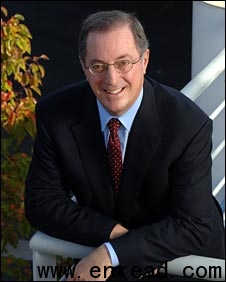| ||||||||||||||||||||||||||||||||||||||||||||||||||||||||
|
The PC industry is coming out of the recession, the boss of the world's biggest chipmaker has told the BBC. 世界上最大的芯片制造商对BBC透漏道,个人电脑行业已经走出困境。  Paul Otellini was interviewed by the BBC The chief executive of Intel said the industry was likely to sell as many computers in 2009 as it had in 2008. "Considering the depth and breadth(宽度) of the recession [that] is a pretty good result," said Paul Otellini. Analysts1 had predicted a big fall in PC sales this year, but Mr Otellini said consumers were still buying them because they were now "indispensable". "If it breaks you don't wait for the end of the recession to replace it," he added. Record fine Last week, Intel's shares rose sharply after the company told the market that its third quarter revenues(收入,收益) would be higher than expected, the latest signal that the worst of the recession is over for the technology industry. "We're coming out of it," said Mr Otellini. In a wide-ranging interview, featuring questions sent in by BBC News website readers, Intel's chief executive attacked EU regulators and said policy mistakes had contributed to the depth of the recession. In May, the EU imposed a record fine of 1.06bn euros (£920m) on Intel, charging the firm with anti-competitive practices. Mr Otellini said he was confident that an EU fine for anti-competitive practices would be overturned. "We'll appeal the decision out of Brussels, I'm comfortable we'll win," he said. "The process was one that did not look at all the evidence and didn't balance all the facts." Asked what he'd learned from the recession, he said, "What I've learned in our industry is that the best technology still sells. "You can't take a break - recessionary or other - from deploying2 new technology. "When recessions end, as we've seen, people want the latest technology - they don't want the technology that existed when the recession started two years ago," he said Personal But he said there were also lessons for society: "Some of the folly3(愚蠢,荒唐事) we saw in the housing market, and with derivatives4(派生物,衍生产品), led to a lot of problems and that probably deserves a bit more scrutiny5(研究) and more regulation." And he had this message for politicians and regulators. "At the highest level do your job and protect the people that you're supposed to protect." BBC readers had also asked how the Intel chief saw technology changing over the next 25 years. He said computing6 would become far more personal. "Machines you carry with you will be cognisant(已认知,晓得) of what your needs are and where you are. They will bring the information to you without you having to ask a search engine for it." Mr Otellini also insisted that Wimax, a technology backed by Intel giving mobile internet access over a wide area, was going to be successful. Rival systems, promoted by mobile phone companies, are gaining ground in the hunt for so-called 4G connectivity. "Wimax is a very viable7(能养活的,能生育的) fourth generation technology," he said. "It's proven, it's up and running in countries like Japan, the United States and Russia." 点击  收听单词发音 收听单词发音
|
||||||||||||||||||||||||||||||||||||||||||||||||||||||||
- 发表评论
-
- 最新评论 进入详细评论页>>



